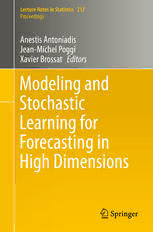Table Of ContentLecture Notes in Statistics 217
Proceedings
Anestis Antoniadis
Jean-Michel Poggi
Xavier Brossat E ditors
Modeling and
Stochastic
Learning for
Forecasting in
High Dimensions
Lecture Notes in Statistics 217
EditedbyP.Bickel,P.Diggle,S.E.Fienberg,U.Gather,
I.Olkin,S.Zeger
Moreinformationaboutthisseriesat
http://www.springer.com/series/694
Anestis Antoniadis • Jean-Michel Poggi (cid:129)
Xavier Brossat
Editors
Modeling and Stochastic
Learning for Forecasting
in High Dimensions
123
Editors
AnestisAntoniadis Jean-MichelPoggi
DepartmentofStatistics LaboratoiredeMathématiques
UniversityJosephFourier UniversitéParis-Sud
Grenoble,France OrsayCedex,France
XavierBrossat
ElectricitédeFranceR&D,OSIRIS
ClamartCedex,France
ISSN0930-0325 ISSN2197-7186 (electronic)
LectureNotesinStatistics
ISBN978-3-319-18731-0 ISBN978-3-319-18732-7 (eBook)
DOI10.1007/978-3-319-18732-7
LibraryofCongressControlNumber:2015941890
SpringerChamHeidelbergNewYorkDordrechtLondon
©SpringerInternationalPublishingSwitzerland2015
Thisworkissubjecttocopyright.AllrightsarereservedbythePublisher,whetherthewholeorpartof
thematerialisconcerned,specificallytherightsoftranslation,reprinting,reuseofillustrations,recitation,
broadcasting,reproductiononmicrofilmsorinanyotherphysicalway,andtransmissionorinformation
storageandretrieval,electronicadaptation,computersoftware,orbysimilarordissimilarmethodology
nowknownorhereafterdeveloped.
Theuseofgeneraldescriptivenames,registerednames,trademarks,servicemarks,etc.inthispublication
doesnotimply,evenintheabsenceofaspecificstatement,thatsuchnamesareexemptfromtherelevant
protectivelawsandregulationsandthereforefreeforgeneraluse.
Thepublisher,theauthorsandtheeditorsaresafetoassumethattheadviceandinformationinthisbook
arebelievedtobetrueandaccurateatthedateofpublication.Neitherthepublishernortheauthorsor
theeditorsgiveawarranty,expressorimplied,withrespecttothematerialcontainedhereinorforany
errorsoromissionsthatmayhavebeenmade.
Printedonacid-freepaper
SpringerInternationalPublishingAGSwitzerlandispartofSpringerScience+BusinessMedia
(www.springer.com)
Preface
Forecasting and time series prediction have seen a great deal of development
and attention over the last few decades, fostered by an impressive improvement
in observational capabilities and measurement procedures. Time series prediction
is a challenge in many fields. In finance, one forecasts stock exchange or stock
market indices; data processing specialists forecast the flow of information on
theirnetworks;producersof electricityforecastthe electric load,andhydrologists
forecast river floods. Many methods designed for time series prediction and
forecastingperformwell(dependingonthecomplexityoftheproblem)onarather
short-termhorizonbutareratherpooronalonger-termone.Thisisduetothefact
thatthesemethodsareusuallydesignedtooptimizetheperformanceatshort-term
predictionusingrelativelylowdimensionalmodels.Forlong-termprediction,linear
andnonlinearmethodsandtoolsfortheanalysisandpredictivemodelingofhigh-
dimensionalphenomenaarenecessaryandmoreuseful.
Fromanindustrialpointofview,forecastingtheelectricity/naturalgasconsump-
tionofconsumersis yetanotherchallenge.Inordertobe abletoprovideaccurate
forecasts on different horizons (from short term, the next hour, to middle term,
several years) and at different levels of aggregation (from complete portfolio to
localdemand),theseforecastshavetobedoneinanevolvingenvironment.Indeed,
national demand is increasing, uses are changing, the number of available data is
significantlygrowing(thankstosmartmeters),theindividualrenewableelectricity
generationisbecomingimportant,andsmartgridsaredeveloping.Ontheotherside
of electricity markets, renewables provide a bigger and bigger part of electricity
generation.Forecastingwindorsolar powerisalso difficultbecauseoftheirinner
variability,theneedforaccurateandlocalmeteorologicalforecastsatanyhorizon–
from a few hours up to several days ahead – as well as the rapid evolution of
operatinginstallations.
OnJune5–7,2013,aninternationalworkshoponIndustryPracticesforForecast-
ingwasheldinParis,France,organizedandsupportedbytheOSIRISDepartmentof
EDFR&D,locatedinClamart,France.OSIRISstandsforOptimizationSimulation
Risks and Statistics for energymarkets. The meeting was the second in the series
v
vi Preface
of the WIPFOR conferencesand was attended by several researchers(academics,
industrial and professionals, and other interested parties) from several countries.
Followingtradition,boththeoreticalstatisticalresultsandpracticalcontributionsof
this active field of statistical research and on forecasting issues in a fast evolving
industrialenvironmentwerepresented.Theprogramandabstractsareavailableon
theconferencewebsite(http://conferences-osiris.org/wipfor/13-Main-page).
Theeditorsofthisvolumehopethattheselecturenotesreflectthebroadspectrum
of the conference, as it includes 16 articles contributed by specialists in various
areas in this field. The material compiled is fairly wide in scope and ranges
from the development of results on forecasting in industry and in time series, on
nonparametricandfunctionalmethods,ononlinemachinelearningforforecasting,
andontoolsforhigh-dimensionalandcomplexdataanalysis.
The articles are arranged and numbered in alphabetical order by author rather
thansubjectmatter.Papers1,3,5,and9arededicatedtononparametrictechniques
for short-term load forecasting in the industry and include classical curve linear
regression, sparse functional regression based on dictionaries, as well as a new
estimation procedure based on iterative bias reduction. Papers 11 and 14 focus
on electrical system changes: the first is dedicated to large-scale electrical load
simulationforsmartgridsusingGAMmodeling;thesecondfocusesonspace-time
trajectories of wind power generation including parameterized precision matrices
based on a Gaussian copula approach. Paper 7 provides flexible and dynamic
modelingofdependenciesviacopulas.Papers6,8,and13exploredifferentaspects
ofonlinelearningrangingfromthemostoperationalforonlineresidentialbaseline
estimation to the more theoretical, which focuses on oracle boundsfor prediction
errorsrelatedtoaggregationstrategies.Thethirdoneisdedicatedtotheaggregation
of experts proposing some resampling ideas to enlarge the basic family of the
so-calledexperts.Papers2,4,7,12,and16studysomegeneralapproachestohigh-
dimensional and complex data (inference in high-dimensional models, graphical
modelsandmodelselection,adaptivespotvolatilityestimationforhigh-frequency
data, functionalclassification and prediction).Finally, papers10 and 15 deal with
somespecialtopicsin time series, namely,modelingandpredictionof time series
arisingonagraphandoptimalreconciliationofcontemporaneoushierarchicaltime
seriesforecasts.
We would like to address our gratitude to the keynote speakers and all the
contributors for accepting to participate in these Lecture Notes, and we greatly
appreciatethetimethattheyhavetakentopreparetheirpapers.
To conclude, we would like to acknowledge the following distinguished list
of reviewers who helped improve the papers by providing general and focused
feedback to the authors: U. Amato, R. Becker, R. Cao, J. Cugliari, G. Fort, P.
Fryzlewicz, F. Gamboa, B. Ghattas, I. Gijbels, S. Girard, E. Gobet, Y. Goude, R.
Hyndman,I.Kojadinovic,S.Lambert-Lacroix,J.-M.Loubes,E.Matzner-Løber,G.
Oppenheim,P.Pinson,G.Stoltz,A.Verhasselt,A.Wigington,andQ.Yao.Wethank
themagainfortheirwork,dedication,andprofessionalexpertise.
Preface vii
Finally,tothe editorialofficeofSpringer-Verlagandparticularlyto EvaHiripi,
wearegratefulfortheirefficientassistance.
Grenoble,France AnestisAntoniadis
Clamart,France XavierBrossat
Paris,France Jean-MichelPoggi
Paris,June2014.
Contents
ShortTermLoadForecastingintheIndustryforEstablishing
ConsumptionBaselines:AFrenchCase ...................................... 1
José Blancarte, Mireille Batton-Hubert, Xavier Bay,
Marie-AgnèsGirard,andAnneGrau
ConfidenceIntervalsandTestsforHigh-DimensionalModels:
ACompactReview............................................................... 21
PeterBühlmann
ModellingandForecastingDailyElectricityLoadviaCurve
LinearRegression................................................................ 35
HaeranCho,YannigGoude,XavierBrossat,andQiweiYao
ConstructingGraphicalModelsviatheFocusedInformation
Criterion .......................................................................... 55
GerdaClaeskens,EugenPircalabelu,andLourensWaldorp
FullyNonparametricShortTermForecastingElectricity
Consumption ..................................................................... 79
Pierre-AndréCornillon, Nick Hengartner,Vincent Lefieux,
andEricMatzner-Løber
ForecastingElectricityConsumptionbyAggregatingExperts;
HowtoDesignaGoodSetofExperts.......................................... 95
PierreGaillardandYannigGoude
FlexibleandDynamicModelingofDependenciesviaCopulas ............. 117
IrèneGijbels,KlausHerrmann,andDominikSznajder
OnlineResidentialDemandReductionEstimationThrough
ControlGroupSelection......................................................... 147
LeslieHatton,PhilippeCharpentier,andEricMatzner-Løber
ix

